7 Referral program examples You Should Know
7 Referral program examples You Should Know
Ollie Efez
November 10, 2025•18 min read
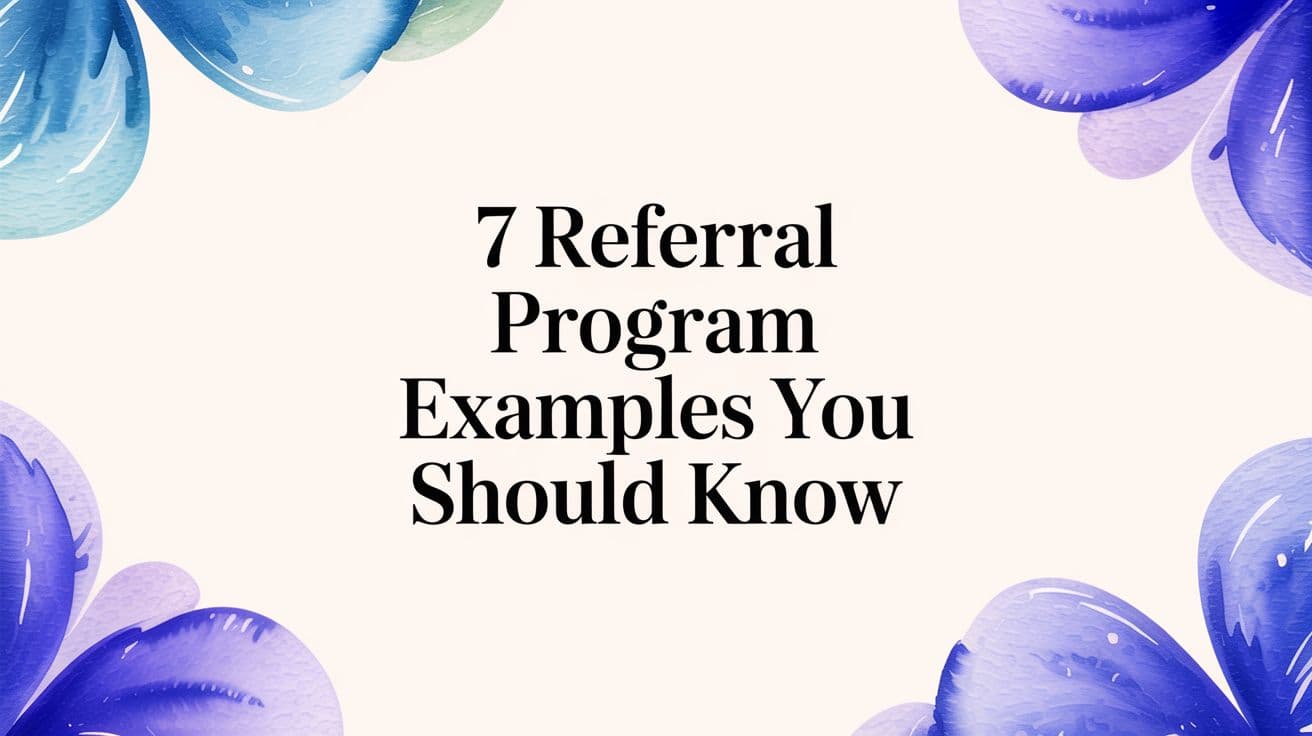
Word-of-mouth marketing remains one of the most powerful tools for growth. A well-designed referral program doesn't just acquire new customers; it brings in highly qualified leads who already trust your brand because a friend recommended it. But how do you build a program that actually works? The best way to learn is by studying successful referral program examples.
This guide is designed to give you a strategic breakdown of what makes top-tier referral programs succeed. We'll go beyond surface-level descriptions to analyze the mechanics, incentives, and psychological triggers behind each one. Our goal is to provide a blueprint you can adapt for your own business, whether you're a SaaS startup, an e-commerce brand, or a content creator. When developing your program, it's also beneficial to look at broader viral marketing campaign examples to understand the dynamics of rapid growth and widespread adoption.
You will find a curated list of high-performing platforms and real-world examples. Each entry includes:
- A detailed analysis of its core strategy.
- Screenshots to show how the program works in practice.
- Actionable takeaways you can apply immediately.
- Direct links to explore each platform further.
Let's dive into the examples that can help you turn your existing customers into your most effective marketing channel.
1. LinkJolt
LinkJolt earns its top spot by providing a powerful, SaaS-centric platform designed to launch and scale a high-performance affiliate or referral program with minimal friction. It strips away the typical complexities and high costs, allowing businesses to set up a fully functional program in under a minute. This focus on speed and efficiency makes it one of the best referral program examples for companies that prioritize rapid growth and operational simplicity.
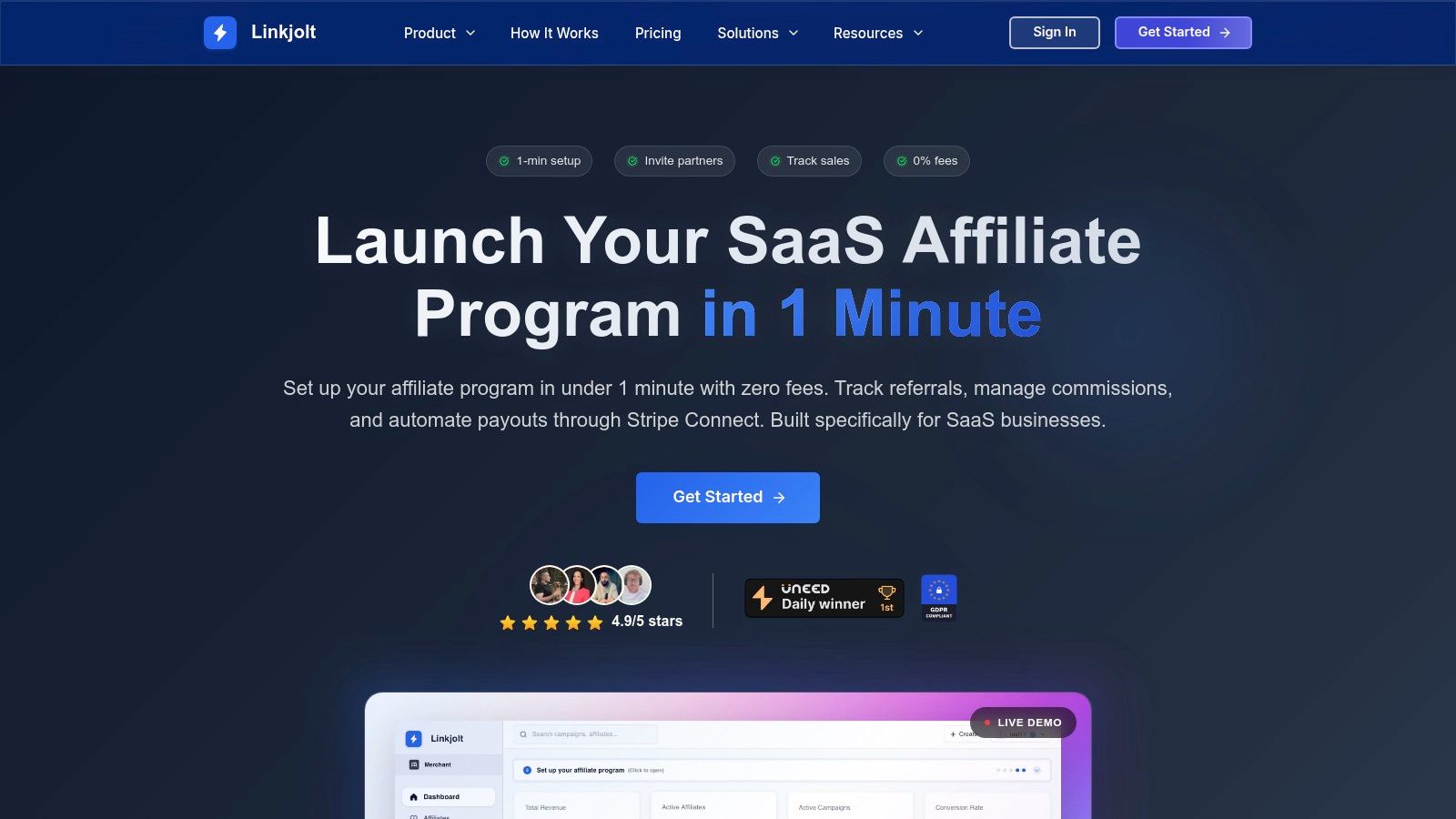
The platform is engineered specifically for subscription-based businesses, a critical differentiator in the market. While many tools handle one-time sales well, LinkJolt excels at tracking the entire SaaS customer lifecycle, from trial sign-ups to recurring subscription renewals. This ensures partners are accurately compensated for the long-term value they generate.
Strategic Analysis: Key Differentiators
What sets LinkJolt apart is its strategic blend of powerful features and a disruptive pricing model. Its core philosophy revolves around empowering businesses to keep more of their revenue, which is evident in its 0% platform transaction fees. This is a significant advantage over competitors who often take a percentage of every commission paid out.
Here’s a breakdown of its standout capabilities:
- SaaS-Optimized Tracking: The platform’s ability to track recurring commissions and attribute conversions from free trials is a game-changer for subscription companies. It aligns partner incentives directly with long-term customer value, not just initial sign-ups.
- Frictionless Onboarding: The "1-minute no-code setup" isn't just a marketing claim; it’s a core feature. This rapid deployment allows marketing teams to go live almost instantly, without needing developer resources.
- Global Payout Automation: With automated payouts via Stripe Connect and mass-payout support for PayPal and Wise, LinkJolt simplifies the often-complex process of paying partners in over 200 countries.
- Comprehensive Partner Portal: Affiliates get their own dedicated portal to access marketing assets, track performance in real-time, and manage their unique referral links and coupon codes. This transparency builds trust and encourages engagement.
Actionable Takeaways & Use Cases
For any business looking to build a robust referral engine, LinkJolt offers a clear and replicable strategy. Startups can leverage the platform to quickly establish a partner program and attract early adopters, while enterprise teams can use its advanced features to scale globally. The platform's structure provides a strong foundation if you want to learn how to create a referral program that drives results.
Key Insight: The most effective referral programs remove barriers for both the business and its partners. LinkJolt achieves this with a no-code setup, automated payouts, and zero platform fees, making participation easy and profitable for everyone involved.
Pricing Overview:
Pros:- Cost-Effective: 0% platform transaction fees maximize your ROI.
- SaaS-Focused: Built-in support for recurring commissions and trial conversions.
- Extremely Fast Setup: Launch a complete program in minutes without code.
- Scalable: Tiers support businesses from early-stage startups to large enterprises.
Cons:
- The Starter plan has notable limitations on affiliate numbers and data retention.
- Payment processor fees (e.g., Stripe, PayPal) still apply to payouts.
2. ReferralCandy
ReferralCandy is a unique entry because it's both a powerful tool and an extensive educational resource. It’s a platform designed to help e-commerce stores create and automate their own referral programs, but its most valuable asset for research is its massive library of real-world referral program examples and detailed case studies. This makes it a one-stop-shop for both inspiration and implementation.
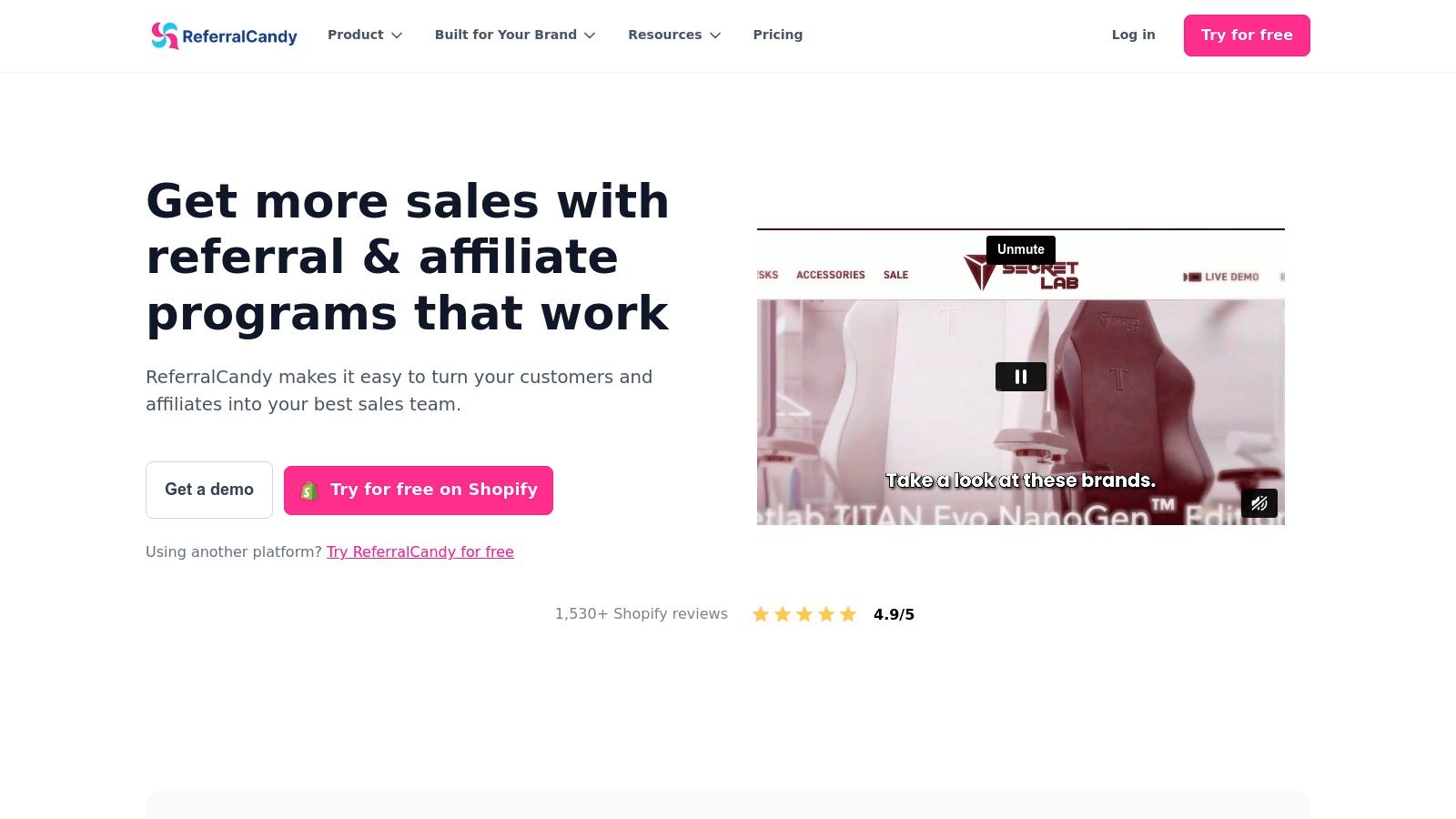
Unlike generic lists, ReferralCandy’s blog breaks down the exact strategies, rewards, and results of programs built on its own platform. This gives you a behind-the-scenes look at what truly works for brands in specific niches, from fashion and beauty to food and beverage. You can study a successful program and then use the same software to launch a similar one for your own store.
Key Features & Strategic Insights
- Deep Dive Case Studies: The site provides detailed analyses of brands like Riff Raff & Co, which generated over $1.5 million in referred sales. These studies quantify metrics like referral rate, revenue generated, and overall ROI, offering concrete proof of what's possible.
- Actionable Content: The content is not just theoretical. It directly connects successful examples to the software features needed to replicate them, bridging the gap between strategy and execution.
- Broad E-commerce Focus: You can find examples across dozens of categories, making it easy to find a relevant model for your specific industry.
- Seamless Integration: The platform integrates with major e-commerce tools like Shopify, BigCommerce, Klaviyo, and Recharge, making it highly practical for existing online stores. For a detailed comparison with other tools, you can read this review of the best referral marketing software.
Practical Takeaways
ReferralCandy is an ideal starting point if you run an e-commerce business. Use their case studies not just for reward ideas, but to understand the entire customer journey. Pay close attention to how successful brands promote their program via email, on-site pop-ups, and post-purchase pages. The platform's free resources offer a masterclass in e-commerce referral marketing before you even sign up.
Website: https://www.referralcandy.com/3. Referral Rock
Referral Rock serves a dual purpose as both a comprehensive referral marketing software and a valuable educational resource. Its curated gallery of live referral programs offers a high-level overview of strategies across various industries, making it an excellent source for initial research. While the platform is designed to help businesses build, manage, and automate their own programs, its examples hub is a key asset for anyone studying successful referral program examples.
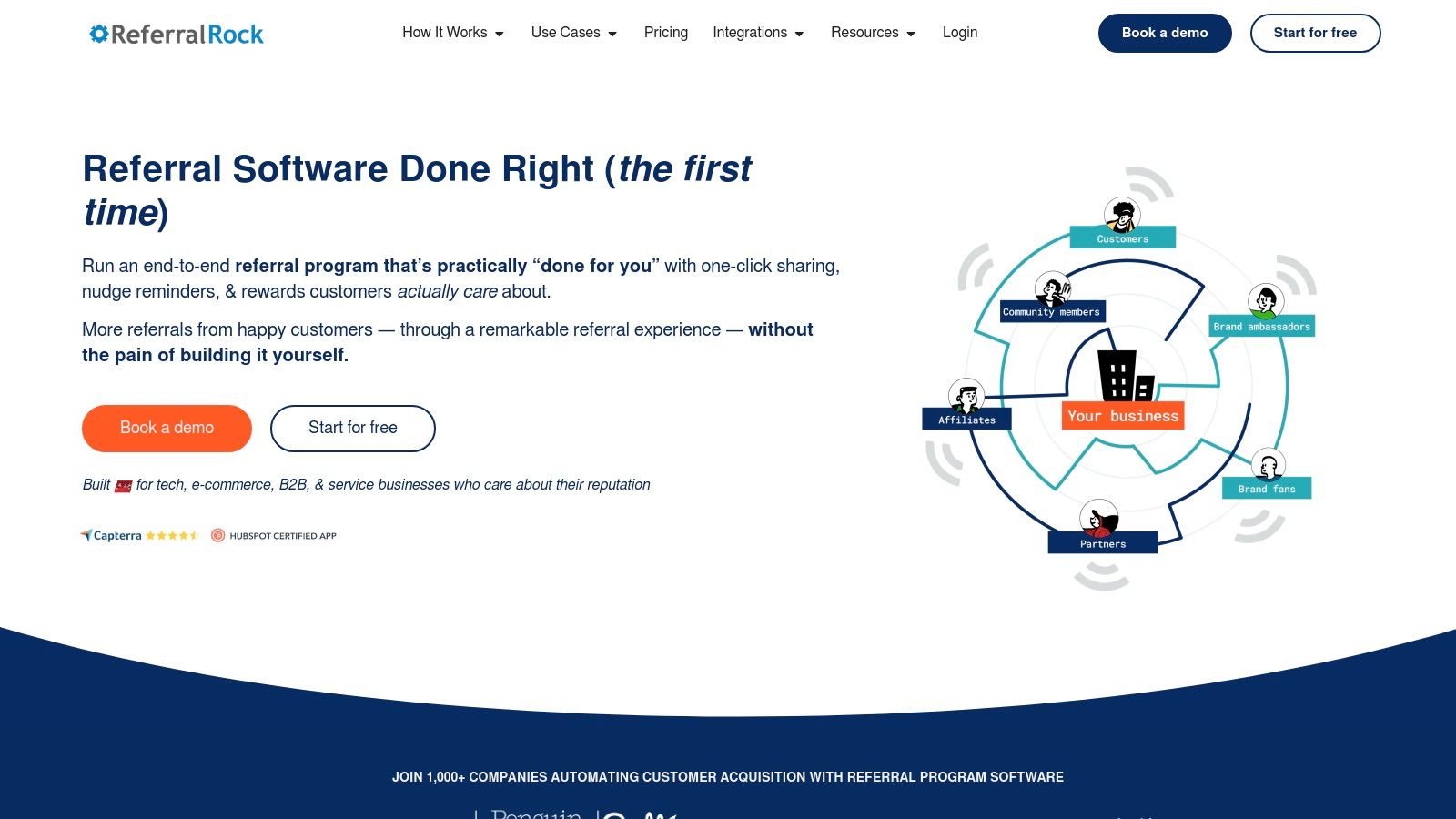
Unlike resources focused purely on e-commerce, Referral Rock provides insights into B2C services, SaaS, apps, and enterprise-level programs. Its example pages clearly summarize the reward structures and core mechanics of each program, allowing you to quickly compare different incentive models. This broad approach helps you understand how referral strategies are adapted for different business types, from service-based companies to complex software platforms.
Key Features & Strategic Insights
- Diverse Industry Examples: The site features a dedicated examples hub covering B2C, e-commerce, apps, and services. This allows you to find relevant models outside of the typical direct-to-consumer product space.
- Clear Program Summaries: Each example provides a concise breakdown of how the program works, including the advocate's reward and the friend's incentive. This is perfect for quick, high-level comparisons.
- Mid-Market & Enterprise Focus: The platform itself is geared towards mid-market and enterprise clients, meaning its resources often reflect the needs of more complex organizations.
- Broad Integrations: Referral Rock connects with key business systems like HubSpot, Salesforce, Shopify, and WooCommerce, highlighting its role as a central hub for referral management.
Practical Takeaways
Use Referral Rock's examples hub to get a broad view of the referral marketing landscape, especially if your business is not in e-commerce. The concise summaries are ideal for brainstorming initial reward structures. Pay attention to how different industries balance cash rewards, discounts, and service credits. Once you have a few ideas, you can explore their software to see how those concepts could be implemented and automated for your own business.
Website: https://referralrock.com/4. Friendbuy
Friendbuy is an enterprise-grade referral and loyalty platform that serves as a rich resource for high-level strategic insights. While it provides powerful software, its real value for research comes from its detailed case studies and blog content, which break down the specific tactics used by well-known, high-growth brands. It offers a masterclass in dissecting successful referral program examples from a results-driven perspective.
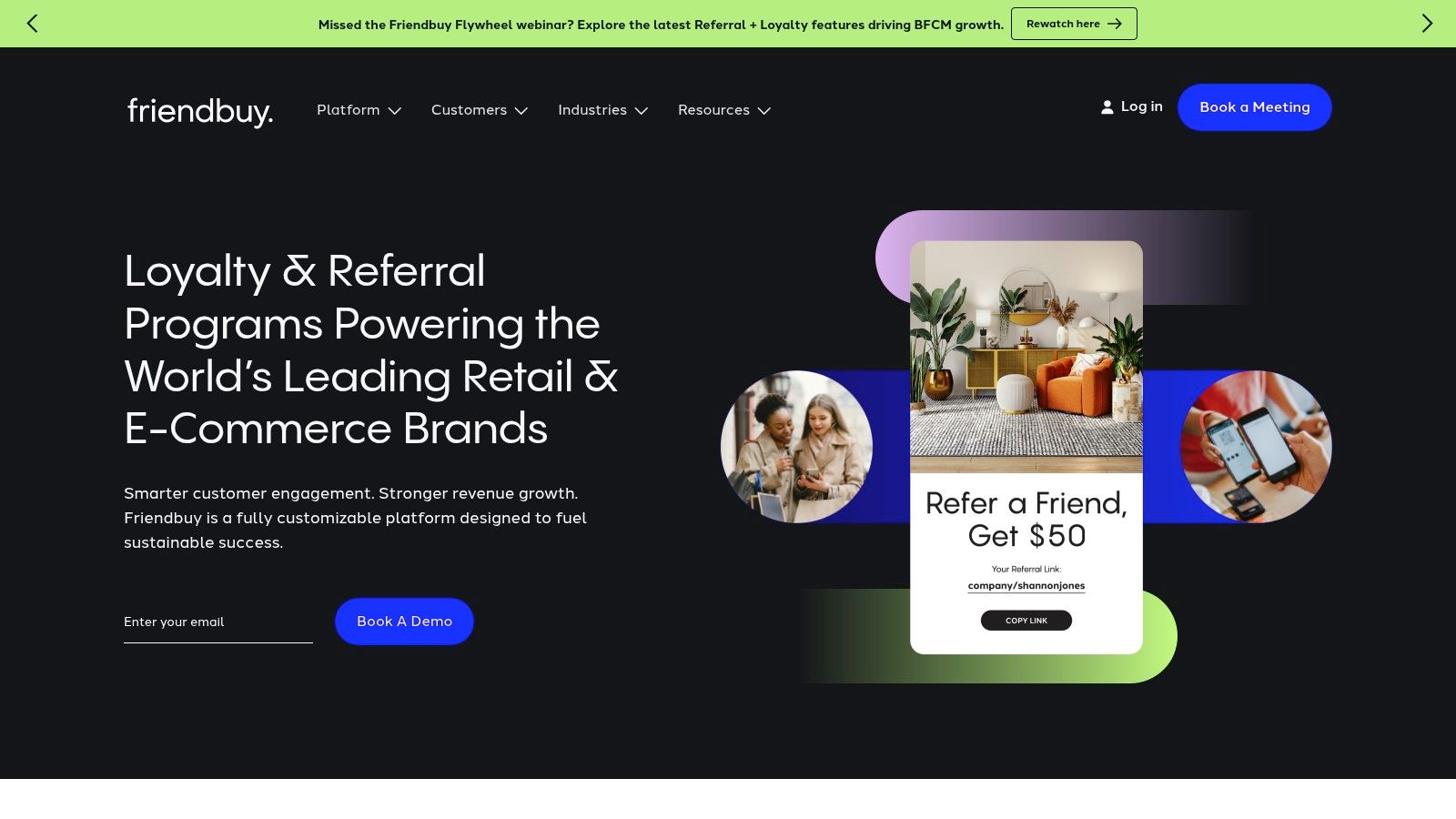
Unlike platforms focused solely on small businesses, Friendbuy showcases what works at scale for recognizable names like Casper, Spanx, and Dollar Shave Club. The content goes beyond surface-level descriptions to analyze A/B tests, incentive structures, and specific program flows that drive significant revenue. This makes it an invaluable source for marketers aiming for sophisticated, enterprise-level implementations.
Key Features & Strategic Insights
- In-Depth Case Studies: Friendbuy provides detailed analyses of customer programs, outlining the specific challenges, solutions, and measurable outcomes. They often quantify results like referral revenue, customer acquisition cost reduction, and conversion rate lift.
- Tactical Blog Content: The blog features guidance posts that dissect real program structures, reward mechanics, and promotional strategies, offering actionable lessons on what works for top direct-to-consumer and retail brands.
- Enterprise-Grade Integrations: The platform’s focus on integrations with tools like Segment, Klaviyo, and various CDPs highlights how modern referral programs fit into a larger marketing technology stack.
- Focus on A/B Testing: Many examples and posts emphasize the importance of continuous optimization, providing insights into which headlines, offers, and calls to action perform best.
Practical Takeaways
Use Friendbuy’s resources to understand the mechanics behind programs that have successfully scaled. Pay close attention to their case studies to learn how major brands structure two-sided incentives and promote their programs across multiple channels. Because the platform is built for enterprise clients, the examples offer a look into more complex, data-driven strategies that smaller companies can adapt and aspire to.
Website: https://www.friendbuy.com/5. Viral Loops
Viral Loops is a powerful, no-code platform that lets you build and launch sophisticated viral marketing campaigns inspired by proven success stories. It moves beyond standard programs by offering a template library based on the mechanics of famous campaigns like those from Dropbox, Harry's, and The Hustle. This makes it an invaluable resource for finding referral program examples that you can quickly clone and adapt for your own business.
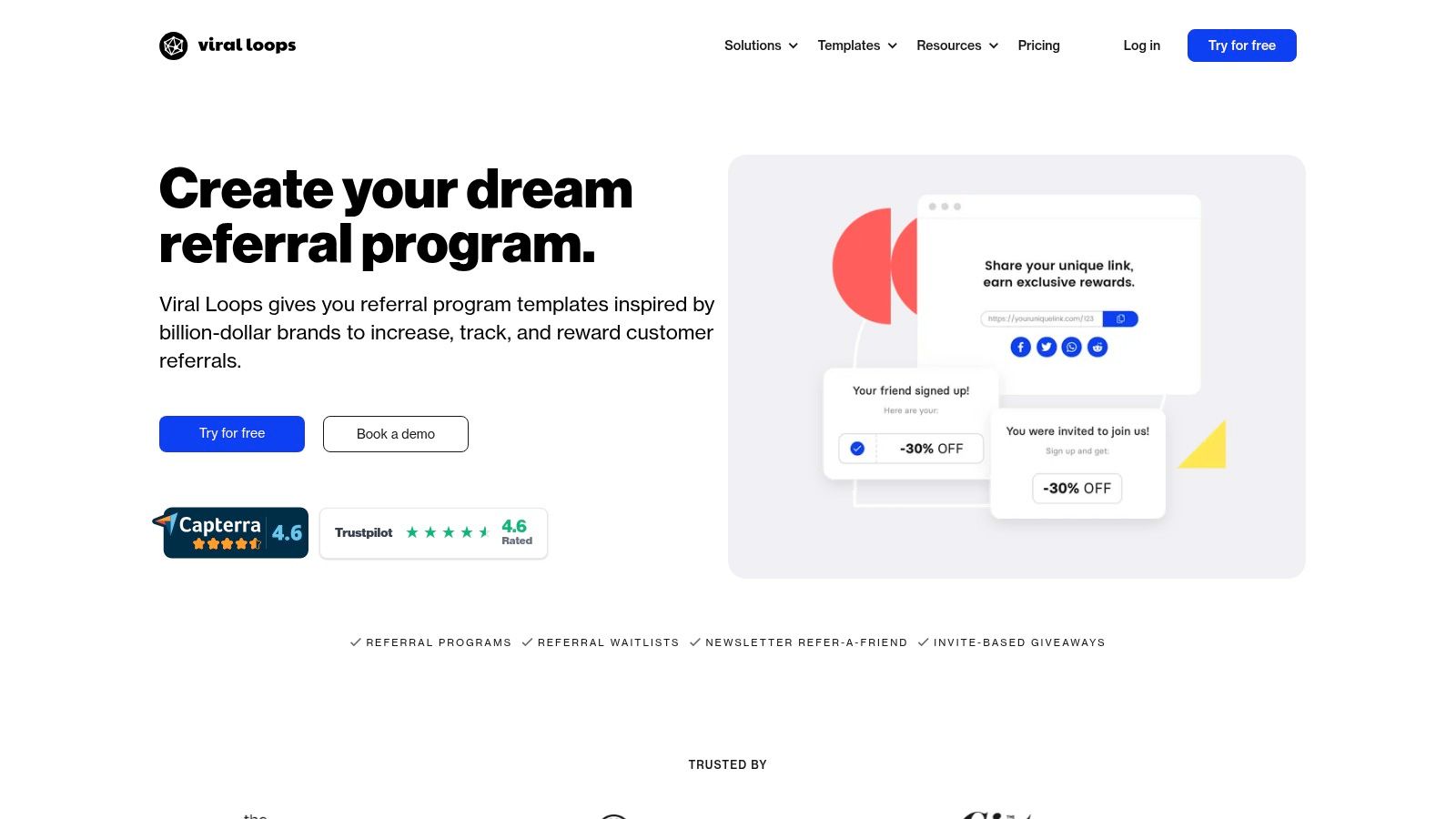
Unlike platforms focused solely on traditional refer-a-friend models, Viral Loops specializes in diverse campaign types. You can create milestone programs, pre-launch waitlists, newsletter growth campaigns, and competitive leaderboards without writing a single line of code. This template-driven approach dramatically lowers the barrier to entry for launching complex, high-engagement referral systems.
Key Features & Strategic Insights
- Template-Driven Campaigns: The platform's core strength is its library of pre-built templates. You can choose a model like "The Milestone Referral" (used by The Hustle) and have a similar framework running in minutes.
- Diverse Campaign Types: It supports a wide range of viral mechanics, including pre-launch waitlists to build buzz, leaderboard contests to drive competition, and newsletter referrals to grow your audience.
- No-Code Implementation: Viral Loops is designed for marketers, not developers. The entire setup process is visual and intuitive, allowing for rapid deployment.
- Built-in Automation: The platform handles crucial functions like fraud detection, participant tracking, and automated reward fulfillment, streamlining campaign management. It also integrates with tools like Zapier, Shopify, and Segment.
Practical Takeaways
Viral Loops is ideal for businesses that want to experiment with different types of viral and referral campaigns beyond the standard "give $10, get $10" model. Start by browsing their template library to see which proven growth loop aligns with your goals. For a product launch, the waitlist template is a perfect fit. For a content-driven business, the newsletter referral template can accelerate subscriber growth. The self-serve pricing and free trial make it easy to test its capabilities.
Website: https://viral-loops.com/6. Shopify Blog (Referral Program guide)
The Shopify Blog offers one of the most practical and up-to-date educational guides on referral marketing. Instead of being a software platform, it’s a comprehensive editorial resource designed to teach merchants the fundamentals of creating a successful program from scratch. It’s an essential first read for anyone in the Shopify ecosystem looking to understand strategy before committing to a specific app.
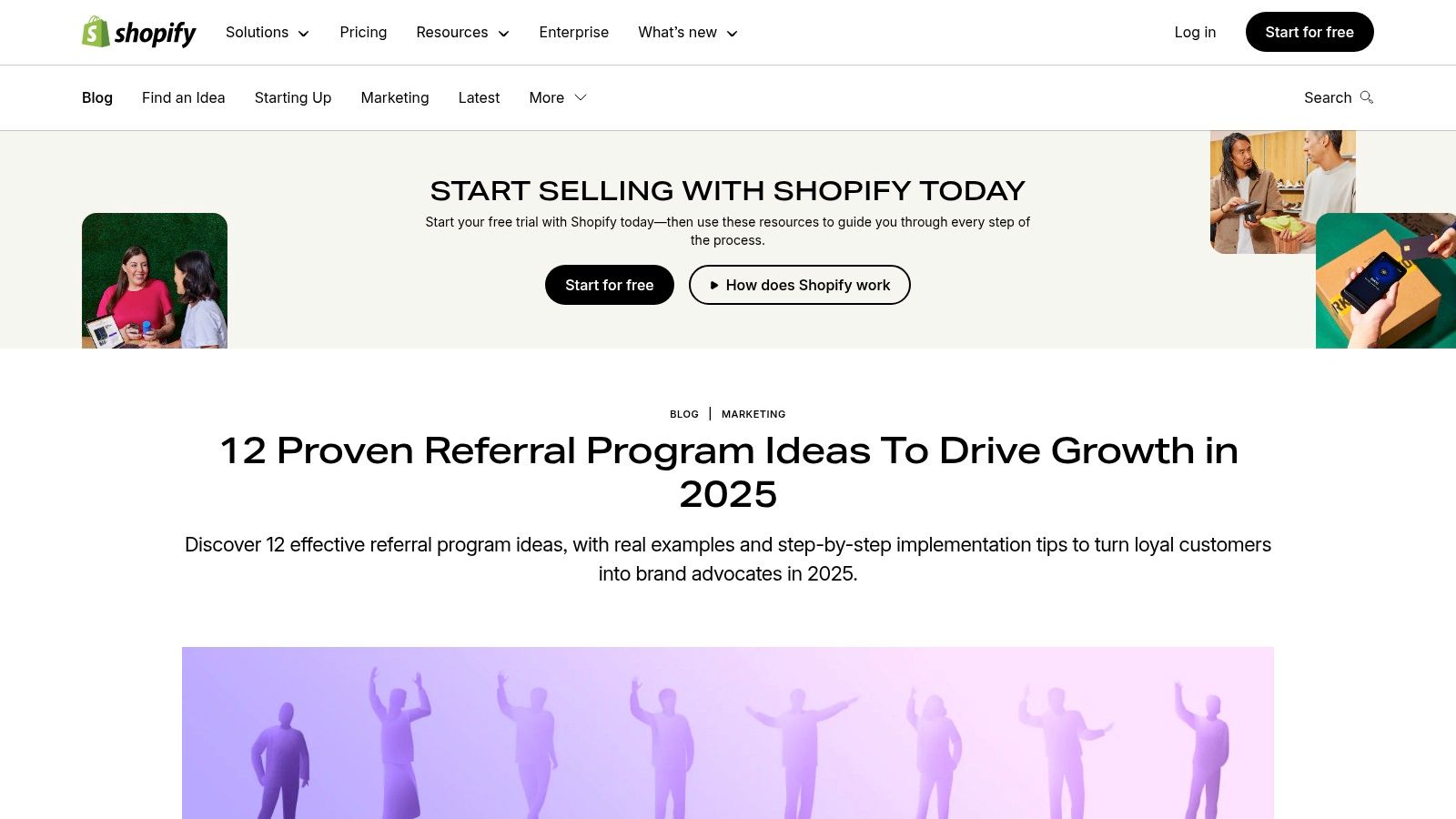
This guide stands out by breaking down complex strategies into simple, actionable steps. It features 12 distinct referral program examples and ideas, illustrating how real brands leverage word-of-mouth marketing. The content is updated regularly (currently reflecting June 2025 trends), ensuring the advice and examples are fresh and relevant for today's e-commerce landscape.
Key Features & Strategic Insights
- Step-by-Step Guidance: The article provides a clear, seven-step process for building a referral program, covering everything from setting goals to choosing the right software from the Shopify App Store.
- Modern Incentive Ideas: It goes beyond simple cash rewards, exploring creative incentives like tiered rewards, contest entries, and charitable donations that resonate with modern consumers.
- Practical Promotion Tactics: A key strength is its focus on promotion. It details how to use email marketing, social media, and on-site messaging to maximize program visibility and participation.
- Ecosystem Integration: While the advice is universal, it naturally points users toward tools and apps that integrate seamlessly with the Shopify platform, making implementation straightforward for store owners. For a broader look at strategies, you can also explore these marketing referral program ideas.
Practical Takeaways
Use the Shopify Blog guide as your foundational blueprint. It’s perfect for brainstorming the structure of your program and understanding what incentives might work best for your audience. Pay close attention to the section on promotion, as even the best program will fail without effective marketing. Its vendor-neutral approach provides an unbiased education, helping you make an informed decision before you even start comparing software options.
Website: https://www.shopify.com/blog/referral-program7. G2 – Referral Software Category
G2 is an invaluable research hub rather than a single program example. It's a leading software marketplace where you can find, compare, and read verified user reviews for dozens of referral marketing platforms. Its referral software category page acts as a command center for anyone tasked with selecting a tool to build and manage their own program, offering a transparent, crowd-sourced perspective on the market.
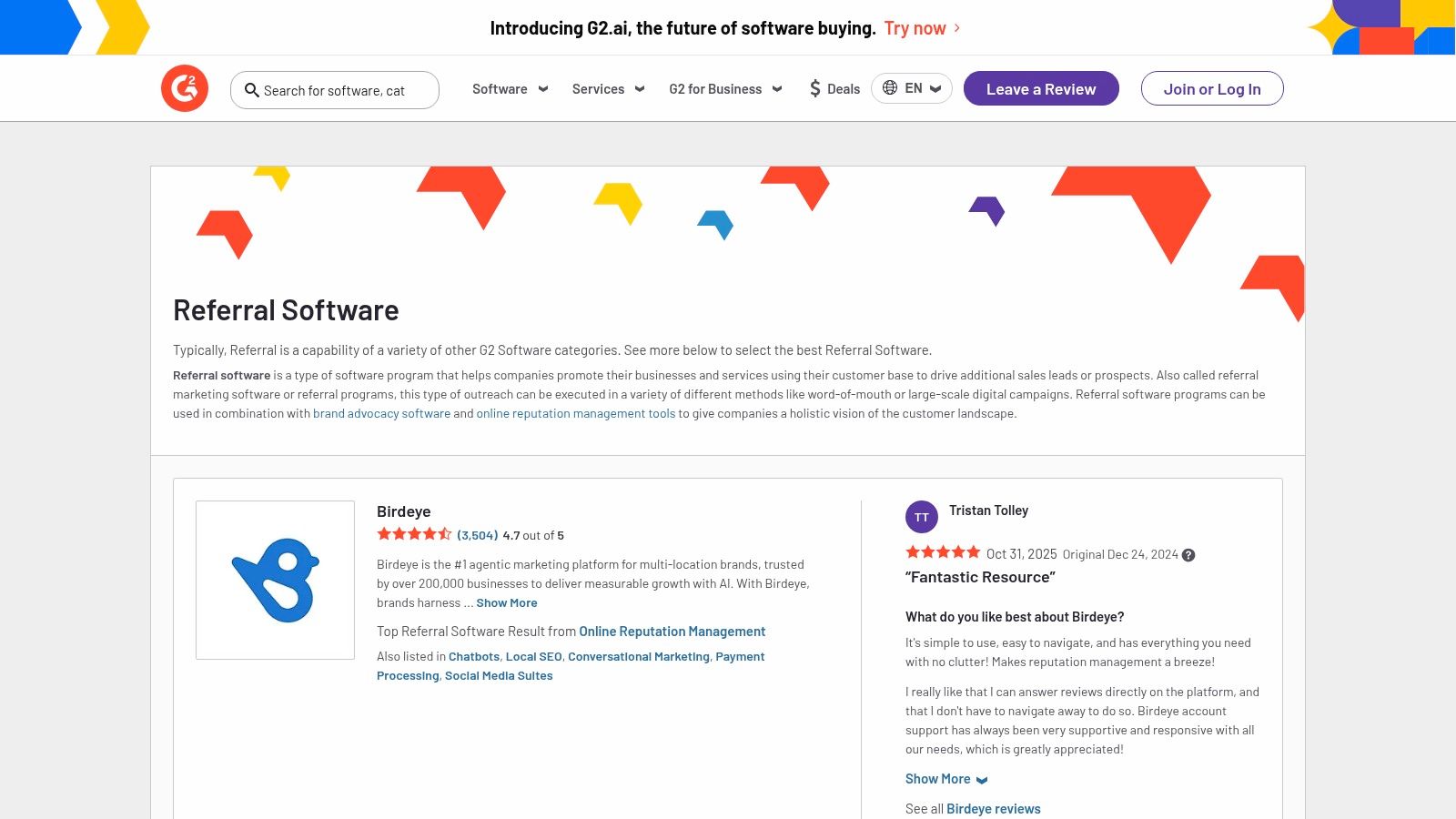
Instead of showcasing one company's strategy, G2 gives you the tools to discover hundreds of referral program examples indirectly. By exploring the top-rated software vendors, you can access their websites, case studies, and customer stories. This allows you to see which tools power the programs for brands you admire and find real-world templates and success stories directly from the source.
Key Features & Strategic Insights
- Verified User Reviews: G2’s core strength is its library of authentic reviews from real business users. You can filter feedback by company size, role, and industry to see how a platform performs for businesses like yours.
- Feature Comparison Grids: The platform offers side-by-side comparisons of features, pricing models, and integrations, dramatically speeding up the vendor shortlisting process.
- Vendor Case Studies: Most software vendors listed on G2 link directly to their own case studies and customer success stories, providing a rich source of proven referral program structures and reward ideas.
- Market Reports: G2 regularly publishes "Grid Reports" that map out the landscape of referral software, identifying market leaders, high performers, and niche solutions. When evaluating various referral software, it's also worth looking into comprehensive partnership platforms like the Impact affiliate network, which can manage both affiliate and referral programs.
Practical Takeaways
Use G2 at the beginning of your research to build a shortlist of potential software partners. Read both positive and negative reviews to understand each platform's true strengths and weaknesses. Once you identify a few top contenders, visit their websites and dive into their specific customer examples. This approach ensures you're not just picking a tool, but also learning from the successful programs it has helped create.
Website: https://www.g2.com/categories/referralTop 7 Referral Program Comparison
Final Thoughts
We've explored a powerful collection of referral program examples and the tools that power them, from the automated simplicity of ReferralCandy to the enterprise-level customization offered by Friendbuy. The key takeaway is clear: a successful referral program isn't just a marketing tactic; it's an engine for sustainable, trust-based growth.
By analyzing these real-world examples, we see that the most effective programs are built on a deep understanding of customer motivation and behavior. They make sharing effortless, offer incentives that truly resonate, and create a seamless experience for both the advocate and the new customer.
Key Takeaways from Our Examples
Remember these core principles as you build your own program:
- Simplicity is King: A complicated referral process is a dead one. If a user needs a manual to figure out how to share, they won't. Focus on one-click sharing and clear, concise instructions.
- Incentives Must Align: The reward must match the effort and the value of a new customer. Whether it's a cash bonus, a product discount, or exclusive access, the incentive should feel like a genuine "thank you."
- Double-Sided Rewards Drive Action: Rewarding both the referrer and the new friend creates a powerful win-win scenario. The friend gets an immediate benefit for trying your product, and the referrer is motivated to share that benefit.
- Promotion is Non-Negotiable: You can't just build it and expect them to come. Promote your referral program everywhere: in email signatures, on your dashboard, in transaction confirmations, and through dedicated campaigns.
Choosing Your Tool and Taking the Next Step
The right tool is the one that fits your specific business stage and goals. A startup might prioritize the ease of setup found in a tool like ReferralCandy, while an enterprise SaaS company may need the deep integration capabilities of Referral Rock or Friendbuy.
Before you commit, ask yourself these questions:
- What is my primary goal? (e.g., lead generation, direct sales, user acquisition)
- What is my budget? (e.g., percentage of revenue, fixed monthly cost)
- What technical resources do I have? (e.g., dedicated developer, no-code marketer)
- How will I measure success? (e.g., referral conversion rate, cost per acquisition)
Answering these will guide you to the platform that can best execute your vision. These referral program examples show what's possible when strategy meets the right technology. Your journey is to find the perfect combination for your brand. Start small, test your incentives, measure everything, and iterate. The most powerful marketing channel you have is your existing happy customers. It's time to empower them.
Ready to turn these examples into your own success story? LinkJolt provides a powerful yet simple platform to build, launch, and manage a high-performing referral program without the complexity. Start creating your own powerful referral engine today at LinkJolt.
Watch Demo (2 min)
Trusted by 300+ SaaS companies
Start Your Affiliate Program Today
Get 30% off your first 3 months with code LINKJOLT30
✓ 3-day free trial
✓ Cancel anytime